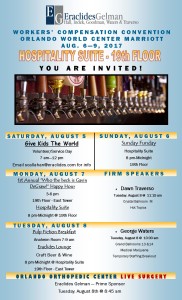Greetings, last week the 1st DCA expanded the misrepresentation “fraud” defense in Foods v. Howard (1D16-1789). (Click Here)
In this case, there was no dispute that the claimant was involved in an accident while operating a front-end loader. However he did not seek any medical attention until after he had been terminated , two months after the accident. At the hospital, claimant said his injuries were due to being hit in the head with a baseball bat eight days earlier.
In his deposition, when confronted with the hospital records, the claimant said he made the misrepresentation to the hospital due to his belief he would not receive treatment if he reported it was work-related.
Also, the claimant had a history of preexisting treatment which he denied/did not reveal to either IME physician.
However, both doctors testified they had the preexisting medical records and were aware of his prior treatment.
The JCC found the claimant did not violate the misrepresentation statute (440.105) because his history to the hospital was not for the purpose of obtaining WC benefits as required by 440.09(4). Also, since the doctors had the actual records, his statements to them about his prior history were nullified as the providers did have accurate information.
As to this aspect, the 1st DCA said:
“Furthermore, a plain reading of sections 440.105(4) and 440.09(4) provides no basis for the JCC’s exoneration of the misrepresentations. It matters not whether the doctors were provided with accurate information regarding etiology of injuries or pre-existing medical conditions and treatment by a source other than the Claimant. The purpose of section 440.105(4) is to sanction “any person” who, with the requisite intent, commits any of the enumerated, prohibited acts.”
So, the fact that the claimant misrepresented his history to the doctors is not fixed by the fact that the doctors had the records.
The other misrepresentation issue may have a bigger impact, the statements to the hospital that his condition was not work related. Historically the JCC’s have not found this to be misrepresentation because it was not for the purpose of obtaining WC benefits, but actually avoiding WC. And in this case, although he filed a PFB for payment of the hospital bill in question as well as the eye/head injuries, he dismissed those claims before the trial. The 1st DCA looked at the misrepresentation statute and specifically noted (their emphasis):
“Section 440.105(4)(b) declares that it “shall be unlawful for any person:”
1. To knowingly make, or cause to be made, any false, fraudulent, or misleading oral or written statement for the purpose of obtaining or denying any benefit or payment under this chapter.”
And then they addressed the dismissal of those issues:
“However, this formal dismissal of claims does not shield the Claimant from the reach of section 440.09(4). A party may not strategically manipulate pleadings to circumvent its sanctions.”
So even though the misrepresentation statements to the hospital were not made to secure WC benefits, they were arguably made to deny WC benefits. And subsequently when he asked for the injuries treated at the hospital to be covered and the bill to be paid, although ultimately dismissed, it brought it under the gamut of the WC misrepresentation statute.
This is important because I have seen many claims where the initial unauthorized treatment does not reference the work injury, and then later the claimant alleges it is work related. These statements are now potentially misrepresentation, on a case by case basis of course.
Believe it or not, the WCI Fla Work Comp Conference is next week. Here is a flyer with our events and goings on. Hope to see you there!
Sincerely,
Morgan Indek | Partner


